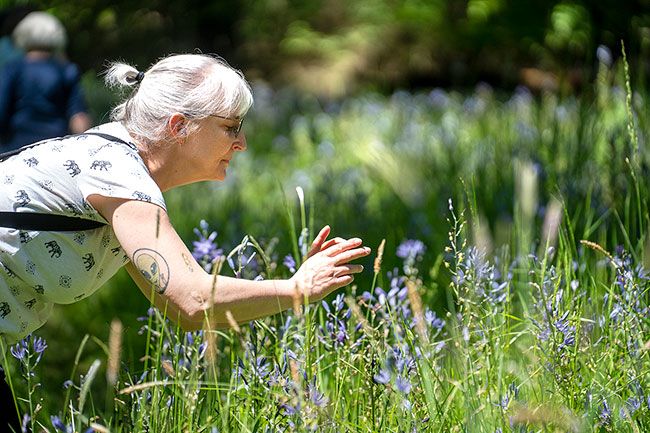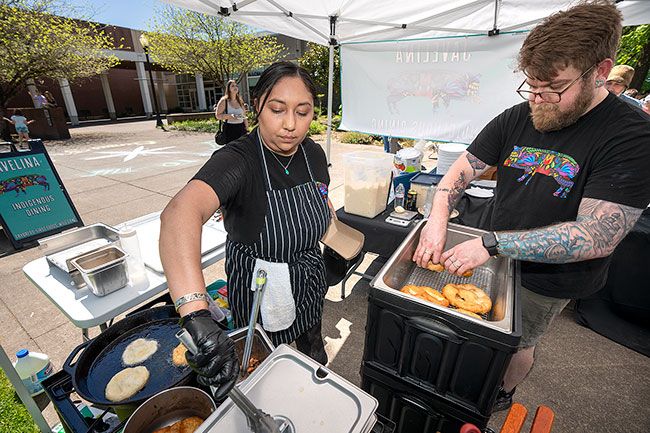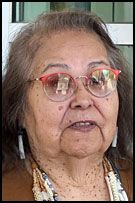Festival creates channels of gratitude for culture, camas



“Gifts in friendship” — strands of blue beads — were presented to students and staff including Linfield interim president Becky Johnson, by Confederated Tribes of Grand Ronde chairwoman Cheryl Kennedy and tribal council member Denise Harvey.
“We’re very pleased that the honoring of our first foods and traditions taking place here,” Kennedy said in Camas Festival opening ceremonies on May 10.
Camas Festival started in 2022 as an effort by Linfield and the Grand Ronde, and Yamhill Watershed Council, to honor the tradition of camas root and flower, along with oak and other traditional foods, as well as modern efforts by Linfield students to study and revitalize camas flower patches. Overall, Camas Festival is about educating people about the living history that is camas as a natural product vital to Kalapuya culture.
Camas flowers are currently in bloom in Cozine ravine on Linfield campus.
“We are grateful to see so many people from Grand Ronde community,” Johnson said in her welcoming remarks on the steps of Linfield’s Nicholson Library, home base for the day’s festival. Johnson extended thanks to Linfield students “who have worked for many years to care for and restore the camas plants. Their stewardship is inspired by the Kalapuyans.” Dr. William Fleeger, chairman of the Linfield Environmental Studies Program, with a new set of beads around his neck, also welcomed the 50 or so people on hand
“It is wonderful to see the growth, literally of this festival from its beginning three years ago,” said Linfield’s Gerardo Ochoa, who began working in 2021 with the Grand Ronde to create the event. Ochoa, vice president for enrollment and management and student access, recalled people gathering under tents in the oak grove with rain coming down in the 2022 event in the oak grove,
“Beyond the Camas Festival itself,” Ochoa said. “This is a day to look at the land around us and the impact on our beautiful campus. The symbol of our Linfield is the oak tree, and we learned from the Grand Ronde that the oak is an important source of food. Patches of oaks were managed for generations,” he said, noting that a 25-year-old oak can feed a person for a year, one aged 50 can support four people, and a 100-year-old oak can sustain a family.
Kennedy spoke of the sustenance from the land through the lens of her own career in health, saying she loved working in health “and foods are healing.
“Also, laugh often, laugh loud; it helps. Keep yourself moving and make sure your spiritual person is fed daily,” Kennedy said
“It is wonderful to be socially involved and socially connected. My tribe is a clannish people, and while there are other tribes that have other characteristics, it’s all based on food stuffs.
“Here in the Northwest we are blessed, we have it all. These foods are why we’re here.”
The Kalapuyans remain a welcoming, sustaining people despite being deprived of their ancestral lands by 19th century treaties – “really, a scheme,” Kennedy said. She recounted how indigenous people gave food to Lewis and Clark and taught them about edible plants, and during the Civil War local tribe members gave food to white families whose adult males had gone east to fight.
“And that continues on today, our people have always been taught, ’you give and you will get more in return if you do this’. This has been the principle and the motto we follow.
“What a tremendous gift to us to know you too celebrate this plant that helps heal and sustain us,” Kennedy said.
The historic hosts ended the opening ceremony with a traditional “table song,” by tribal members David Harrelson, Greg Archuleta and Chris Remple.
“We sing this when we’re going to share a meal together,” Harrelson said, “And today, with the idea of camas as a first food, and in honor of cooks and in honor of camas as a traditional food.”












Comments